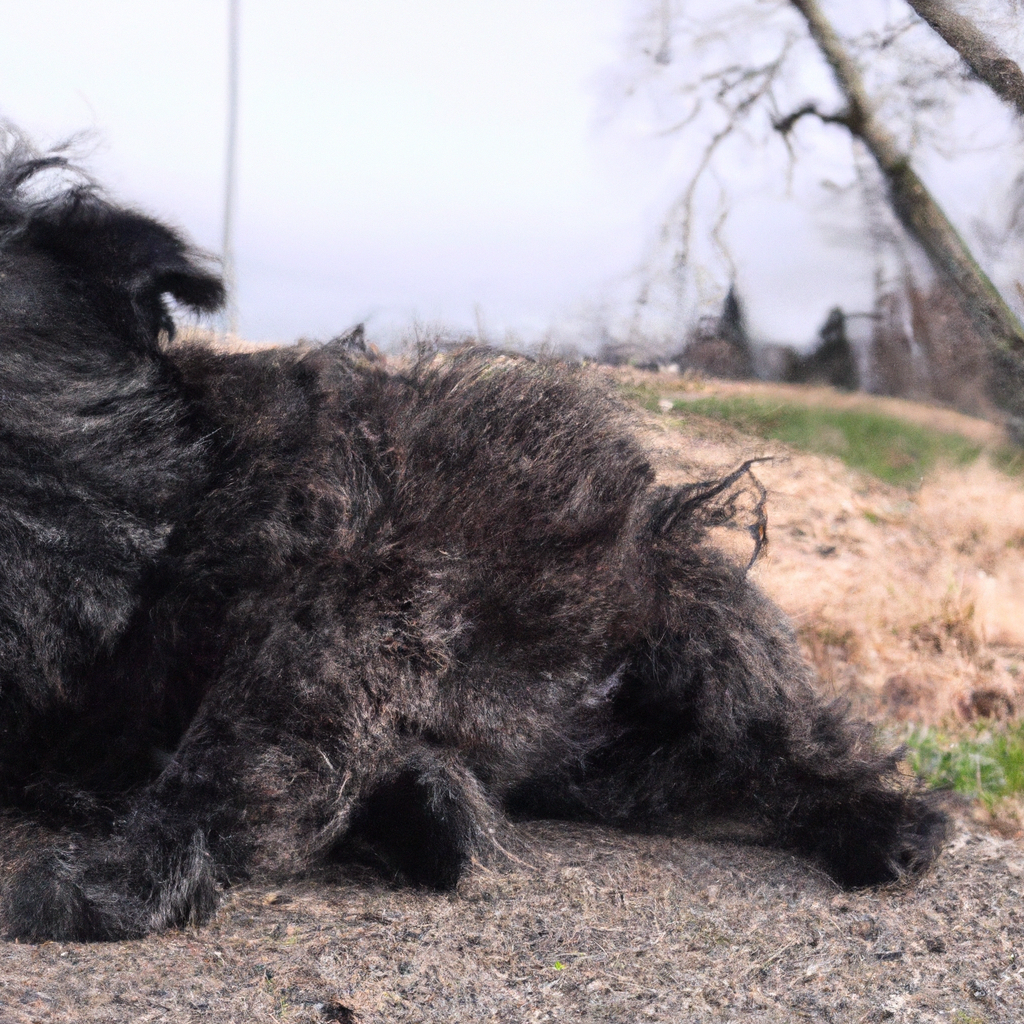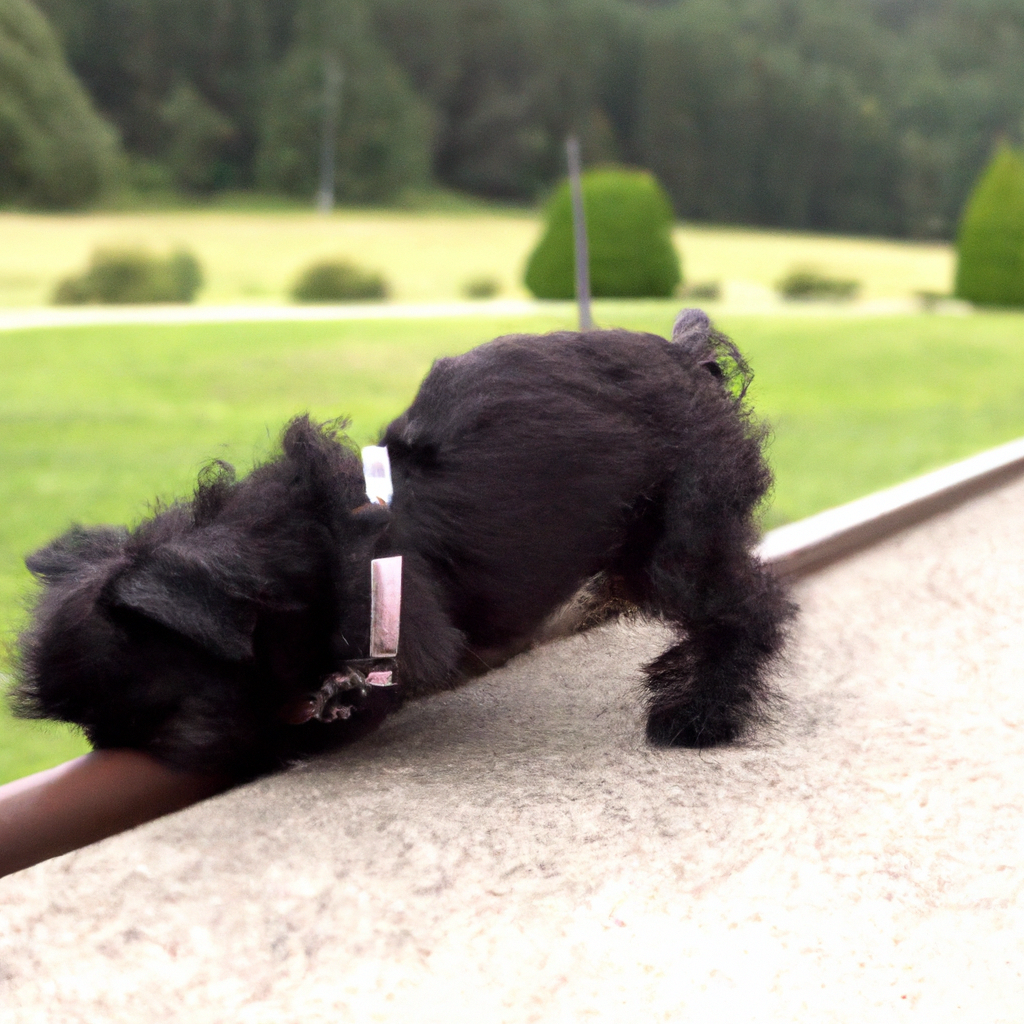The lifespan of an Affenpinscher, like any other breed of dog, can be influenced by a variety of factors. These include genetics, diet and nutrition, exercise, access to veterinary care, and the overall lifestyle they lead. Genetic predispositions to certain health conditions can potentially shorten their lifespan, while a balanced diet and regular exercise can help to extend it. Regular check-ups with a vet can also ensure that any health issues are detected and treated early. The environment in which they live, including factors such as stress levels and exposure to hazards, can also have a significant impact on an Affenpinscher’s lifespan.
Understanding the Genetic Factors Influencing the Lifespan of Affenpinschers
The Affenpinscher, affectionately known as the “Monkey Dog” due to its primate-like appearance and playful nature, is a small breed that typically enjoys a lifespan of 12 to 15 years. However, like all breeds, the lifespan of an Affenpinscher can be influenced by a variety of factors, including genetics. Understanding these genetic factors can help owners provide the best possible care for their Affenpinscher, potentially extending their lifespan and improving their quality of life.
Genetics play a significant role in determining the lifespan of an Affenpinscher. Certain inherited traits can predispose these dogs to specific health conditions that may impact their longevity. For instance, Affenpinschers are known to be genetically predisposed to hip dysplasia, a condition that affects the joint’s structure and can lead to arthritis. This condition can significantly impact an Affenpinscher’s mobility and overall quality of life, potentially reducing their lifespan.
Another genetic factor that can influence an Affenpinscher’s lifespan is their predisposition to certain heart conditions. Patent Ductus Arteriosus (PDA) is a congenital heart defect that is more common in Affenpinschers than in many other breeds. If left untreated, PDA can lead to heart failure, significantly shortening an Affenpinscher’s lifespan.
In addition to these specific conditions, the overall genetic diversity within the Affenpinscher breed can also impact their lifespan. Breeds with low genetic diversity are often more susceptible to inherited diseases, which can reduce their lifespan. Fortunately, Affenpinschers are known for having a relatively high level of genetic diversity compared to other breeds, which can contribute to their generally robust health and longevity.
While genetics play a significant role in determining an Affenpinscher’s lifespan, it’s important to remember that they are not the only factor. Environmental factors, such as diet and exercise, can also have a significant impact on an Affenpinscher’s health and longevity. A balanced diet, regular exercise, and regular veterinary check-ups can help mitigate the impact of genetic predispositions and contribute to a longer, healthier life for an Affenpinscher.
Moreover, advances in veterinary medicine are also helping to extend the lifespan of Affenpinschers. Treatments for conditions like hip dysplasia and PDA are becoming more effective, and preventative care is becoming more sophisticated. This means that even if an Affenpinscher is genetically predisposed to certain conditions, there are often treatments available that can manage these conditions and improve their quality of life.
In conclusion, while genetics do play a significant role in determining the lifespan of an Affenpinscher, they are not the only factor. Environmental factors and advances in veterinary medicine also play a crucial role. By understanding these factors, owners can provide the best possible care for their Affenpinscher, potentially extending their lifespan and improving their quality of life. After all, these charming, playful dogs deserve nothing but the best.
The Impact of Diet and Nutrition on the Longevity of Affenpinschers
The Affenpinscher, affectionately known as the “Monkey Dog” due to its primate-like appearance and playful nature, is a small breed that typically enjoys a lifespan of 12 to 15 years. However, like any other breed, the longevity of an Affenpinscher can be significantly influenced by various factors, with diet and nutrition playing a pivotal role.
To begin with, it’s important to understand that Affenpinschers, despite their small size, are energetic dogs that require a balanced diet to maintain their vitality. A diet rich in high-quality proteins is essential for these dogs as it helps to build and repair body tissues, including muscles. Proteins also play a crucial role in the production of hormones and enzymes that are necessary for normal bodily functions.
Carbohydrates, on the other hand, provide the energy that Affenpinschers need for their playful antics. However, it’s important to ensure that the carbohydrates in their diet come from high-quality sources such as whole grains, fruits, and vegetables, rather than processed foods that can lead to obesity and other health issues.
Fats are another important component of an Affenpinscher’s diet. They not only provide a concentrated source of energy but also aid in the absorption of fat-soluble vitamins. Omega-3 and Omega-6 fatty acids, in particular, contribute to a healthy coat and skin, reducing the chances of skin diseases that can affect the Affenpinscher’s lifespan.
While proteins, carbohydrates, and fats form the bulk of an Affenpinscher’s diet, vitamins and minerals are equally important. They play a myriad of roles in the body, from promoting a strong immune system to ensuring proper bone development. A deficiency in any of these nutrients can lead to a variety of health problems, potentially shortening the lifespan of an Affenpinscher.
Feeding your Affenpinscher a balanced diet is only half the battle, though. Portion control is equally crucial. Overfeeding can lead to obesity, which is associated with a host of health problems, including heart disease, diabetes, and arthritis. These conditions can significantly reduce an Affenpinscher’s quality of life and lifespan. Therefore, it’s important to feed your Affenpinscher the right amount of food, taking into account their age, size, and activity level.
In addition to a balanced diet, regular veterinary check-ups are essential to monitor your Affenpinscher’s nutritional status and overall health. Your vet can provide personalized dietary recommendations based on your dog’s specific needs and can also detect any potential health issues early, increasing the chances of successful treatment and a longer lifespan.
Lastly, it’s worth noting that while diet and nutrition are key factors in an Affenpinscher’s lifespan, they are not the only ones. Genetics, exercise, and mental stimulation also play a role in determining how long your Affenpinscher will live. Therefore, in addition to providing a balanced diet, it’s important to ensure that your Affenpinscher gets regular exercise and plenty of mental stimulation to keep them happy and healthy for as long as possible.
In conclusion, the longevity of an Affenpinscher is significantly influenced by diet and nutrition. A balanced diet, portion control, regular vet check-ups, and a healthy lifestyle can all contribute to a longer, healthier life for your Affenpinscher. So, while we can’t control genetics, we can certainly control what our Affenpinschers eat and how they live, and in doing so, we can help them live their best, longest lives possible.
How Regular Exercise Contributes to the Lifespan of Affenpinschers
The Affenpinscher, affectionately known as the “Monkey Dog” due to its primate-like appearance and playful nature, is a small breed that typically enjoys a lifespan of 12 to 15 years. However, like any other breed, the lifespan of an Affenpinscher can be influenced by a variety of factors. One of the most significant of these is regular exercise.
Exercise plays a crucial role in maintaining the overall health of an Affenpinscher. This breed is known for its high energy levels and playful demeanor, which means they require a good amount of physical activity to keep them happy and healthy. Regular exercise helps to keep their heart strong, their muscles toned, and their mind sharp. It also aids in maintaining a healthy weight, which is essential as obesity can lead to a host of health problems that can shorten their lifespan.
Affenpinschers are prone to certain health conditions such as hip dysplasia, heart disease, and respiratory issues. Regular exercise can help to mitigate the risk of these conditions. For instance, cardiovascular exercises like brisk walking or playing fetch can strengthen their heart muscles, reducing the risk of heart disease. Similarly, exercises that promote flexibility and joint health can help to prevent or manage hip dysplasia.
Moreover, exercise is not just beneficial for an Affenpinscher’s physical health, but it also plays a significant role in their mental well-being. Affenpinschers are intelligent and curious dogs that thrive on mental stimulation. Regular exercise, particularly activities that challenge them mentally like agility training or puzzle toys, can help to keep their minds sharp and engaged. This can contribute to a longer, happier life as it helps to stave off cognitive decline and behavioral issues that can arise from boredom or frustration.
However, while regular exercise is essential, it’s also important to remember that not all exercises are suitable for Affenpinschers. Due to their small size and brachycephalic (short-nosed) nature, they can be prone to overheating and respiratory distress if overexerted. Therefore, it’s crucial to choose exercises that are appropriate for their size and physical capabilities. Short, frequent walks and play sessions are often more suitable than long, strenuous workouts.
In addition to regular exercise, a balanced diet, regular vet check-ups, and a loving, stress-free environment also contribute significantly to an Affenpinscher’s lifespan. A diet that is rich in high-quality proteins, healthy fats, and a variety of fruits and vegetables can provide them with the nutrients they need to stay healthy. Regular vet check-ups can help to catch any potential health issues early, while a loving, stress-free environment can contribute to their overall happiness and well-being.
In conclusion, regular exercise plays a significant role in contributing to the lifespan of Affenpinschers. It helps to maintain their physical health, mitigate the risk of certain health conditions, and keep their minds sharp and engaged. However, it’s also important to remember that exercise should be appropriate for their size and physical capabilities, and should be complemented with a balanced diet, regular vet check-ups, and a loving, stress-free environment. With the right care and attention, your Affenpinscher can lead a long, happy, and healthy life.
The Role of Regular Veterinary Care in Extending the Life of Affenpinschers

The Affenpinscher, affectionately known as the “Monkey Dog” due to its primate-like appearance and playful nature, is a small breed that typically lives between 12 to 15 years. However, like any other breed, the lifespan of an Affenpinscher can be influenced by a variety of factors. One of the most significant factors that can impact the longevity of this breed is regular veterinary care.
Regular veterinary care plays a crucial role in extending the life of Affenpinschers. It’s not just about treating illnesses or injuries when they occur, but also about preventative care. Regular check-ups can help detect potential health issues early, before they become serious problems. This early detection can often lead to more effective treatment, which can significantly improve the dog’s quality of life and potentially extend its lifespan.
Vaccinations are a key part of regular veterinary care. They protect Affenpinschers from a variety of serious, potentially life-threatening diseases. Regular deworming is also important, as parasites can cause a range of health problems, from mild discomfort to serious illness. Regular flea and tick prevention is also crucial, as these pests can carry diseases that can severely impact an Affenpinscher’s health.
Dental care is another important aspect of regular veterinary care. Many people don’t realize that dental disease can have serious implications for a dog’s overall health. In fact, poor dental health can lead to heart disease and other serious health problems. Regular dental check-ups and cleanings can help prevent these issues and extend an Affenpinscher’s lifespan.
Nutrition also plays a significant role in an Affenpinscher’s health and longevity. Regular veterinary check-ups can help ensure that your Affenpinscher is getting the right nutrients in the right amounts. Your vet can provide advice on the best diet for your dog, taking into account factors such as age, weight, and overall health.
Regular exercise is also crucial for an Affenpinscher’s health. These dogs are energetic and playful, and regular physical activity can help keep them healthy and happy. Your vet can provide advice on the right amount and type of exercise for your dog.
Finally, regular veterinary care can help manage an Affenpinscher’s weight. Obesity can lead to a range of health problems, including heart disease, diabetes, and arthritis. Regular check-ups can help monitor your dog’s weight and provide advice on diet and exercise to help keep it in the healthy range.
In conclusion, regular veterinary care plays a crucial role in extending the life of Affenpinschers. From vaccinations and deworming to dental care and nutrition advice, regular check-ups can help detect and prevent health issues, ensuring that your Affenpinscher lives a long, healthy, and happy life. So, if you’re lucky enough to share your life with one of these delightful dogs, make sure to schedule regular vet visits. It’s one of the best things you can do for your Affenpinscher’s health and longevity.
Environmental Factors that Affect the Lifespan of Affenpinschers
The Affenpinscher, affectionately known as the “Monkey Dog” due to its primate-like appearance and playful nature, is a small but sturdy breed that typically enjoys a lifespan of 12 to 15 years. However, like all breeds, the lifespan of an Affenpinscher can be influenced by a variety of factors. In particular, environmental factors play a significant role in determining how long these adorable little dogs live.
Firstly, diet is a crucial factor that can significantly impact the lifespan of an Affenpinscher. These dogs are prone to obesity, which can lead to a host of health problems, including heart disease, diabetes, and joint issues. Therefore, it’s essential to provide them with a balanced diet that’s rich in high-quality proteins, healthy fats, and a variety of fruits and vegetables. Avoid feeding them table scraps or foods high in sugar and fat, as these can contribute to weight gain and other health issues.
In addition to diet, exercise is another key environmental factor that can affect an Affenpinscher’s lifespan. Despite their small size, these dogs are energetic and require regular physical activity to stay healthy. Regular walks, playtime in the yard, and even agility training can help keep an Affenpinscher fit and healthy, reducing the risk of obesity and related health problems.
The living environment also plays a significant role in an Affenpinscher’s lifespan. These dogs are well-suited to apartment living due to their small size, but they still need a safe and comfortable environment. Exposure to extreme temperatures, harmful chemicals, or dangerous objects can pose a risk to their health. Therefore, it’s important to provide them with a safe, comfortable living environment, whether that’s a cozy apartment or a house with a fenced yard.
Another environmental factor that can affect an Affenpinscher’s lifespan is the quality of veterinary care they receive. Regular check-ups can help detect potential health issues early, increasing the chances of successful treatment and a longer lifespan. Additionally, preventative care, such as vaccinations and parasite control, can protect an Affenpinscher from a variety of diseases that could potentially shorten their lifespan.
Lastly, the amount of social interaction and mental stimulation an Affenpinscher receives can also influence their lifespan. These dogs are known for their sociable and playful nature, and they thrive on interaction with their human family members. Regular playtime, training sessions, and even just cuddling on the couch can help keep an Affenpinscher mentally stimulated and happy. A happy dog is often a healthy dog, and this can contribute to a longer lifespan.
In conclusion, while genetics do play a role in determining an Affenpinscher’s lifespan, environmental factors such as diet, exercise, living conditions, veterinary care, and social interaction can significantly influence how long these adorable dogs live. By providing an Affenpinscher with a balanced diet, regular exercise, a safe living environment, quality veterinary care, and plenty of social interaction and mental stimulation, you can help ensure that your furry friend enjoys a long, healthy, and happy life.
The Influence of Mental Health on the Lifespan of Affenpinschers
The Affenpinscher, affectionately known as the “Monkey Dog” due to its primate-like appearance and playful nature, is a small but sturdy breed that typically enjoys a lifespan of 12 to 15 years. However, like all living creatures, the lifespan of an Affenpinscher is influenced by a variety of factors. One such factor that is often overlooked is the mental health of the dog.
Just as with humans, mental health plays a significant role in the overall well-being and longevity of dogs. Dogs are sentient beings capable of experiencing a range of emotions, and their mental health can be affected by their environment, lifestyle, and interactions with humans and other animals. Affenpinschers, known for their sociable and adventurous nature, are no exception to this rule.
Affenpinschers are intelligent and active dogs that require regular mental stimulation to stay happy and healthy. Lack of mental stimulation can lead to boredom and frustration, which can manifest in destructive behaviors and even depression. Over time, chronic stress and depression can take a toll on a dog’s physical health, potentially leading to a shortened lifespan.
Therefore, it’s crucial for Affenpinscher owners to provide their pets with plenty of opportunities for mental stimulation. This can be achieved through regular playtime, training sessions, and social interactions with other dogs. Puzzle toys and interactive games can also be beneficial in keeping an Affenpinscher’s mind sharp and engaged.
In addition to mental stimulation, the emotional environment in which an Affenpinscher lives can significantly impact its mental health and, consequently, its lifespan. Dogs are highly sensitive to the emotions of their human companions. If a household is filled with tension and negative emotions, an Affenpinscher may internalize this stress, leading to anxiety and other mental health issues.
On the other hand, a loving, peaceful, and stable home environment can contribute to a dog’s mental well-being. Regular positive interactions with humans, such as petting, cuddling, and verbal praise, can help an Affenpinscher feel secure and loved, promoting good mental health.
Another aspect of mental health that can influence an Affenpinscher’s lifespan is its socialization experiences. Proper socialization from a young age can help an Affenpinscher develop into a confident and well-adjusted adult dog. Dogs that are well-socialized are less likely to develop behavioral problems and are generally happier and healthier.
In contrast, Affenpinschers that have not been adequately socialized may exhibit fear, aggression, or anxiety when faced with unfamiliar situations or individuals. These negative emotions can cause chronic stress, which can negatively impact a dog’s physical health and potentially shorten its lifespan.
In conclusion, the mental health of an Affenpinscher can significantly influence its lifespan. Mental stimulation, a positive emotional environment, and proper socialization are all crucial for promoting good mental health in Affenpinschers. By understanding and addressing these factors, owners can help their Affenpinschers lead longer, happier lives. After all, a happy dog is a healthy dog, and a healthy dog is likely to be a long-lived one.
The Effect of Spaying/Neutering on the Lifespan of Affenpinschers
The Affenpinscher, affectionately known as the “Monkey Dog” due to its primate-like appearance and playful nature, is a small breed that typically enjoys a lifespan of 12 to 15 years. However, like all breeds, the lifespan of an Affenpinscher can be influenced by a variety of factors. One such factor that has been the subject of much debate among pet owners and veterinarians alike is the effect of spaying or neutering on the lifespan of these adorable dogs.
Spaying or neutering, also known as desexing, is a surgical procedure that prevents dogs from reproducing. For female dogs, spaying involves the removal of the ovaries and uterus, while neutering in males involves the removal of the testicles. These procedures are typically recommended for pet dogs to prevent unwanted litters, reduce certain health risks, and often to mitigate behavioral issues related to the reproductive cycle.
Now, you might be wondering, how does this relate to the lifespan of an Affenpinscher? Well, research has shown that spaying or neutering can indeed have an impact on a dog’s lifespan, and this holds true for Affenpinschers as well.
Firstly, spaying or neutering can help to eliminate the risk of certain diseases that are related to the reproductive system. For instance, spayed females are not at risk of developing uterine infections or ovarian and uterine cancers, which are not uncommon in unspayed dogs. Similarly, neutered males are not at risk of testicular cancer. By eliminating these potential health risks, spaying or neutering can indirectly contribute to a longer, healthier life for your Affenpinscher.
Secondly, spaying or neutering can also influence the behavior of your Affenpinscher in ways that may indirectly affect its lifespan. Unneutered males, for example, are often more aggressive and more likely to roam, increasing their risk of accidents or fights with other dogs. By reducing these behaviors, neutering can help to keep your Affenpinscher safe and potentially extend its lifespan.
However, it’s important to note that while spaying or neutering has many benefits, it’s not without potential downsides. Some research suggests that desexing can increase the risk of certain other health issues, such as obesity and orthopedic problems. It’s also worth noting that the age at which a dog is spayed or neutered can influence these risks. For example, dogs that are spayed or neutered at a very young age may be at a higher risk of developing certain health issues later in life.
So, what’s the bottom line? While spaying or neutering can help to reduce certain health risks and potentially extend the lifespan of your Affenpinscher, it’s not a one-size-fits-all solution. The decision to spay or neuter your dog is a personal one that should be made in consultation with your vet, taking into account your dog’s age, health, and lifestyle.
In conclusion, while there are many factors that can influence the lifespan of an Affenpinscher, spaying or neutering is certainly one that deserves consideration. By understanding the potential benefits and risks, you can make an informed decision that’s in the best interest of your furry friend.
How Breed-Specific Health Issues Can Affect the Lifespan of Affenpinschers
The Affenpinscher, affectionately known as the “Monkey Dog” due to its primate-like appearance and playful nature, is a small breed that typically enjoys a lifespan of 12 to 15 years. However, like all breeds, the Affenpinscher’s lifespan can be influenced by a variety of factors, including genetics, diet, exercise, and overall care. One of the most significant factors that can impact the lifespan of an Affenpinscher is breed-specific health issues.
Affenpinschers, despite their small size and generally robust health, are prone to certain health conditions that can potentially shorten their lifespan. One of the most common health issues in this breed is hip dysplasia, a genetic condition that affects the hip joint. Hip dysplasia can lead to discomfort, difficulty moving, and in severe cases, can significantly impact the dog’s quality of life. Regular vet check-ups and maintaining a healthy weight can help manage this condition and prevent it from severely affecting the dog’s lifespan.
Another health issue that can affect the lifespan of Affenpinschers is a condition known as patellar luxation. This is a common issue in small dog breeds, where the kneecap can easily slip out of place. This can cause pain and mobility issues, and in severe cases, may require surgery. Regular exercise and a balanced diet can help keep the Affenpinscher’s weight in check, reducing the strain on their joints and helping to prevent this condition.
Heart disease is another health concern for Affenpinschers. This breed is prone to a condition called mitral valve disease, which affects the heart’s ability to pump blood efficiently. Early detection through regular vet check-ups is crucial in managing this condition and ensuring that it doesn’t significantly impact the dog’s lifespan.
Affenpinschers are also prone to certain eye conditions, including cataracts and progressive retinal atrophy (PRA). These conditions can lead to vision loss, and while they don’t directly impact the dog’s lifespan, they can affect their quality of life. Regular eye exams can help detect these conditions early and allow for prompt treatment.
While these health issues can sound daunting, it’s important to remember that not all Affenpinschers will experience these problems. Many live long, healthy lives with the right care and attention. Regular vet check-ups are crucial in detecting any potential health issues early, and a balanced diet and regular exercise can go a long way in preventing many of these conditions.
In addition to physical health, the mental well-being of an Affenpinscher can also impact its lifespan. This breed is known for its playful and energetic nature, and providing them with plenty of mental stimulation and social interaction can help keep them happy and healthy.
In conclusion, while there are breed-specific health issues that can affect the lifespan of Affenpinschers, many of these can be managed or even prevented with the right care. Regular vet visits, a balanced diet, regular exercise, and plenty of love and attention can help ensure that your Affenpinscher lives a long, healthy, and happy life.The lifespan of an Affenpinscher can be affected by various factors including genetics, diet, exercise, access to preventive veterinary care, and overall living conditions. Genetic predispositions to certain health conditions like heart disease, dental problems, and hip dysplasia can potentially shorten their lifespan. A balanced diet and regular exercise can contribute to their overall health and longevity. Regular veterinary check-ups can help in early detection and treatment of potential health issues. Living conditions, including the level of stress, exposure to hazards, and quality of care, can also significantly impact their lifespan.





